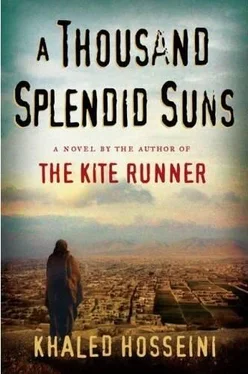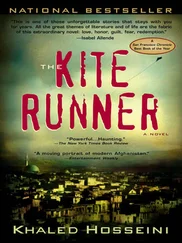I know you're still young, but I want you to understand and learn this now, he said. Marriage can wait, education cannot. You're a very, very bright girl. Truly, you are. You can be anything you want, Laila. I know this about you. And I also know that when this war is over, Afghanistan is going to need you as much as its men, maybe even more. Because a society has no chance of success if its women are uneducated, Laila. No chance.
But Laila didn't tell Hasina that Babi had said these things, or how glad she was to have a father like him, or how proud she was of his regard for her, or how determined she was to pursue her education just as he had his. For the last two years, Laila had received the awal numra certificate, given yearly to the top-ranked student in each grade.
She said nothing of these things to Hasina, though, whose own father was an ill-tempered taxi driver who in two or three years would almost certainly give her away. Hasina had told Laila, in one of her infrequent serious moments, that it had already been decided that she would marry a first cousin who was twenty years older than her and owned an auto shop in Lahore. I've seen him twice, Hasina had said. Both times he ate with his mouth open.
"Beans, girls," Hasina said. "You remember that. Unless, of course" – here she flashed an impish grin and nudged Laila with an elbow – "it's your young handsome, one-legged prince who comes knocking. Then…"
Laila slapped the elbow away. She would have taken offense if anyone else had said that about Tariq. But she knew that Hasina wasn't malicious. She mocked – it was what she did – and her mocking spared no one, least of all herself.
"You shouldn't talk that way about people!" Giti said.
"What people is that?"
"People who've been injured because of war," Giti said earnestly, oblivious to Hasina's toying.
"I think Mullah Giti here has a crush on Tariq. I knew it! Ha! But he's already spoken for, don't you know? Isn't he, Laila?"
"I do not have a crush. On anyone!"
They broke off from Laila, and, still arguing this way, turned in to their street.
Laila walked alone the last three blocks. When she was on her street, she noticed that the blue Benz was still parked there, outside Rasheed and Mariam's house. The elderly man in the brown suit was standing by the hood now, leaning on a cane, looking up at the house.
That was when a voice behind Laila said, "Hey. Yellow Hair. Look here."
Laila turned around and was greeted by the barrel of a gun.
The gun was red, the trigger guard bright green. Behind the gun loomed Khadim's grinning face. Khadim was eleven, like Tariq. He was thick, tall, and had a severe underbite. His father was a butcher in Deh-Mazang, and, from time to time, Khadim was known to fling bits of calf intestine at passersby. Sometimes, if Tariq wasn't nearby, Khadim shadowed Laila in the schoolyard at recess, leering, making little whining noises. One time, he'd tapped her on the shoulder and said, You're so very pretty, Yellow Hair. I want to marry you.
Now he waved the gun. "Don't worry," he said. "This won't show. Not on your hair."
"Don't you do it! I'm warning you."
"What are you going to do?" he said. "Sic your cripple on me? 'Oh, Tariq jan. Oh, won't you come home and save me from the badmash!'"
Laila began to backpedal, but Khadim was already pumping the trigger. One after another, thin jets of warm water struck Laila's hair, then her palm when she raised it to shield her face.
Now the other boys came out of their hiding, laughing, cackling.
An insult Laila had heard on the street rose to her lips. She didn't really understand it – couldn't quite picture the logistics of it – but the words packed a fierce potency, and she unleashed them now.
"Your mother eats cock!"
"At least she's not a loony like yours," Khadim shot back, unruffled. "At least my father's not a sissy! And, by the way, why don't you smell your hands?"
The other boys took up the chant. "Smell your hands! Smell your hands!"
Laila did, but she knew even before she did, what he'd meant about it not showing in her hair. She let out a high-pitched yelp. At this, the boys hooted even harder.
Laila turned around and, howling, ran home.
SHE DREW WATER from the well, and, in the bathroom, filled a basin, tore off her clothes. She soaped her hair, frantically digging fingers into her scalp, whimpering with disgust. She rinsed with a bowl and soaped her hair again. Several times, she thought she might throw up. She kept mewling and shivering, as she rubbed and rubbed the soapy washcloth against her face and neck until they reddened.
This would have never happened if Tariq had been with her, she thought as she put on a clean shirt and fresh trousers. Khadim wouldn't have dared. Of course, it wouldn't have happened if Mammy had shown up like she was supposed to either. Sometimes Laila wondered why Mammy had even bothered having her. People, she believed now, shouldn't be allowed to have new children if they'd already given away all their love to their old ones. It wasn't fair. A fit of anger claimed her. Laila went to her room, collapsed on her bed.
When the worst of it had passed, she went across the hallway to Mammy's door and knocked. When she was younger, Laila used to sit for hours outside this door. She would tap on it and whisper Mammy's name over and over, like a magic chant meant to break a spell: Mammy, Mammy, Mammy, Mammy… But Mammy never opened the door. She didn't open it now. Laila turned the knob and walked in.
SOMETIMES MAMMY had good days. She sprang out of bed bright-eyed and playful. The droopy lower lip stretched upward in a smile. She bathed. She put on fresh clothes and wore mascara. She let Laila brush her hair, which Laila loved doing, and pin earrings through her earlobes. They went shopping together to Mandaii Bazaar. Laila got her to play snakes and ladders, and they ate shavings from blocks of dark chocolate, one of the few things they shared a common taste for. Laila's favorite part of Mammy's good days was when Babi came home, when she and Mammy looked up from the board and grinned at him with brown teeth. A gust of contentment puffed through the room then, and Laila caught a momentary glimpse of the tenderness, the romance, that had once bound her parents back when this house had been crowded and noisy and cheerful.
Mammy sometimes baked on her good days and invited neighborhood women over for tea and pastries. Laila got to lick the bowls clean, as Mammy set the table with cups and napkins and the good plates. Later, Laila would take her place at the living-room table and try to break into the conversation, as the women talked boisterously and drank tea and complimented Mammy on her baking. Though there was never much for her to say, Laila liked to sit and listen in because at these gatherings she was treated to a rare pleasure: She got to hear Mammy speaking affectionately about Babi.
"What a first-rate teacher he was," Mammy said. "His students loved him. And not only because he wouldn't beat them with rulers, like other teachers did. They respected him, you see, because he respected them. He was marvelous."
Mammy loved to tell the story of how she'd proposed to him.
"I was sixteen, he was nineteen. Our families lived next door to each other in Panjshir. Oh, I had the crush on him, hamshiras! I used to climb the wall between our houses, and we'd play in his father's orchard. Hakim was always scared that we'd get caught and that my father would give him a slapping. 'Your father's going to give me a slapping,' he'd always say. He was so cautious, so serious, even then. And then one day I said to him, I said, 'Cousin, what will it be? Are you going to ask for my hand or are you going to make me come khastegari to you?' I said it just like that. You should have seen the face on him!"
Читать дальше












